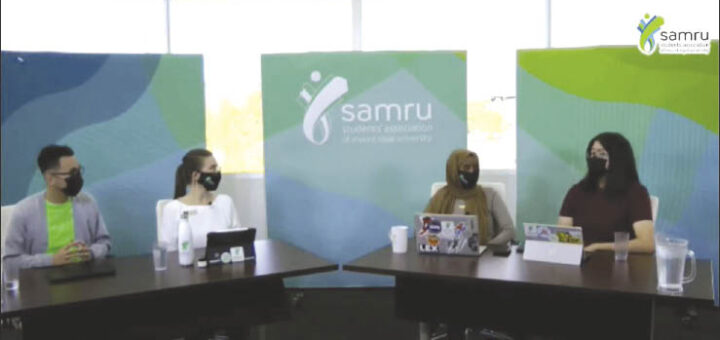As pandemic restrictions adjust, SAMRU clarifies in-person rules, position on vaccine mandate

By Noel Harper, Contributor
As the COVID-19 pandemic continues to bring about a great deal of uncertainty for the Mount Royal community, the Students’ Association of Mount Royal University (SAMRU)’s Representation Executive Council (REC) held a virtual town hall meeting to answer students’ questions and make better sense of the current restrictions.
The university’s pandemic guidelines are ever-changing. What contributed to this is the sudden closure this semester, the Alberta government’s Restrictions Exemption Program coming into effect, and the recent announcement of a vaccine mandate on the horizon.
REC President Spirit River Striped Wolf said, “when the pandemic was declared, any priorities we had were overtaken by new ones that focused on helping support students through the rapid changes and new anxieties they were facing.”
“We’ve been hit with tougher restrictions once again, and student anxiety levels are going up.”
Rules around vaccination against COVID-19 was the subject of several submitted questions, with students wondering what SAMRU’s position was on the mandate. “We are advocating for students who do not have, or do not want to show, proof of vaccination,” Striped Wolf said.
A SAMRU blog post from late August declared the importance of vaccination but rejected the notion of requiring it from students, instead wanting to continue with rapid testing for COVID-19 as an alternative. According to the post, this push was “successful” and the university “agreed with us that students should not be compelled to hand over personal medical records.”
Weeks later, Alberta post-secondaries set a date of Jan. 1, 2022 to require vaccination to be on campus, and Mount Royal began to request proof of vaccination from those who had declared as fully vaccinated.
“Positions […] evolve when new information and evidence becomes available,” Striped Wolf said. “Proof of vaccination is becoming the norm, so this is really … out of our hands at this point.”
SAMRU’s position, however, had not changed. “When it comes to mandatory vaccinations, we represent students, so it’s really important that students aren’t denied their education,” he added.
If a student isn’t, or can’t be, vaccinated by Jan. 1, “we want to help make any transition for you easy and understandable, as well as advocate for leniency for your situation,” said Striped Wolf. Options to this end include switching to online university classes and ensuring students can still graduate if they take the winter semester off in light of these changes.
The rapid test option will continue until then, but students will be required to pay for them starting from Nov. 1, rather than the university providing them for free. SAMRU viewed this as a positive development, saying the province was “not so happy” with the university spending additional funds on these tests.
“The Ministry [of Advanced Education] is not interested in, essentially, taxpayers paying for rapid tests,” said Striped Wolf.
Other questions brought up during the town hall meeting included concerns about in-person learning during the pandemic’s fourth wave, with students saying there is little regard for social distancing or masking rules. One student said it was “almost like COVID wasn’t an issue.”
Mask compliance has “generally” been good, REC vice-president of student affairs Joseph Nguyen said. “Security, they’re not just laying around doing nothing, they are watching and they are being … vigilant on people who aren’t following the rules.”
Striped Wolf reminded students that the province’s exemption program allows for learning environments, such as classrooms and labs, to be omitted from distancing rules to help facilitate in-person learning a priority for SAMRU.
“As users, students pay for facilities, supports, resources and a student experience that can only be experienced in-person,” he said.
The town hall also addressed the possibility of hybrid learning and its multiple definitions. The current ratio of in-person to online courses is approximately 80 per cent to 20 per cent, and for the former, introducing a consistent online option cannot be sustained.
“We’ve talked to the administration about hybrid options for every class … there’s just not the proper technical infrastructure to support something like that,” Striped Wolf said.
Faculty does not have the option to change a course’s delivery format at any point during the semester, except for brief switches in the case of instructor illness, according to vice-president academic affairs Yasmin Ahmed.
Other points of advocacy for SAMRU besides the pandemic include students struggling with financial insecurity, access to higher education regardless of socio-economic background, and greater promotion of Career Services — possibly under a new name.




